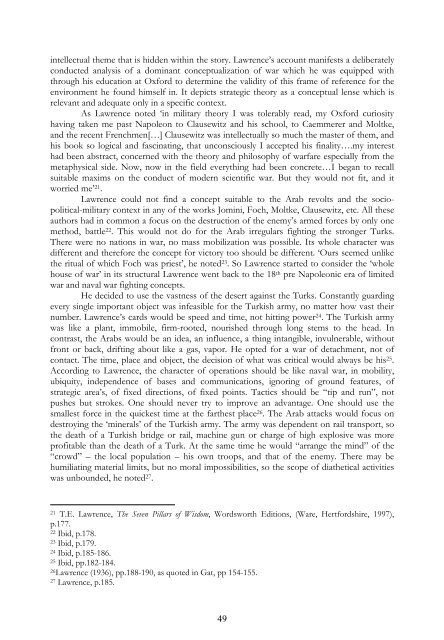Science, Strategy and War The Strategic Theory of ... - Boekje Pienter
Science, Strategy and War The Strategic Theory of ... - Boekje Pienter
Science, Strategy and War The Strategic Theory of ... - Boekje Pienter
Create successful ePaper yourself
Turn your PDF publications into a flip-book with our unique Google optimized e-Paper software.
intellectual theme that is hidden within the story. Lawrence’s account manifests a deliberatelyconducted analysis <strong>of</strong> a dominant conceptualization <strong>of</strong> war which he was equipped withthrough his education at Oxford to determine the validity <strong>of</strong> this frame <strong>of</strong> reference for theenvironment he found himself in. It depicts strategic theory as a conceptual lense which isrelevant <strong>and</strong> adequate only in a specific context.As Lawrence noted ‘in military theory I was tolerably read, my Oxford curiosityhaving taken me past Napoleon to Clausewitz <strong>and</strong> his school, to Caemmerer <strong>and</strong> Moltke,<strong>and</strong> the recent Frenchmen[…] Clausewitz was intellectually so much the master <strong>of</strong> them, <strong>and</strong>his book so logical <strong>and</strong> fascinating, that unconsciously I accepted his finality….my interesthad been abstract, concerned with the theory <strong>and</strong> philosophy <strong>of</strong> warfare especially from themetaphysical side. Now, now in the field everything had been concrete…I began to recallsuitable maxims on the conduct <strong>of</strong> modern scientific war. But they would not fit, <strong>and</strong> itworried me’ 21 .Lawrence could not find a concept suitable to the Arab revolts <strong>and</strong> the sociopolitical-militarycontext in any <strong>of</strong> the works Jomini, Foch, Moltke, Clausewitz, etc. All theseauthors had in common a focus on the destruction <strong>of</strong> the enemy’s armed forces by only onemethod, battle 22 . This would not do for the Arab irregulars fighting the stronger Turks.<strong>The</strong>re were no nations in war, no mass mobilization was possible. Its whole character wasdifferent <strong>and</strong> therefore the concept for victory too should be different. ‘Ours seemed unlikethe ritual <strong>of</strong> which Foch was priest’, he noted 23 . So Lawrence started to consider the ‘wholehouse <strong>of</strong> war’ in its structural Lawrence went back to the 18 th pre Napoleonic era <strong>of</strong> limitedwar <strong>and</strong> naval war fighting concepts.He decided to use the vastness <strong>of</strong> the desert against the Turks. Constantly guardingevery single important object was infeasible for the Turkish army, no matter how vast theirnumber. Lawrence’s cards would be speed <strong>and</strong> time, not hitting power 24 . <strong>The</strong> Turkish armywas like a plant, immobile, firm-rooted, nourished through long stems to the head. Incontrast, the Arabs would be an idea, an influence, a thing intangible, invulnerable, withoutfront or back, drifting about like a gas, vapor. He opted for a war <strong>of</strong> detachment, not <strong>of</strong>contact. <strong>The</strong> time, place <strong>and</strong> object, the decision <strong>of</strong> what was critical would always be his 25 .According to Lawrence, the character <strong>of</strong> operations should be like naval war, in mobility,ubiquity, independence <strong>of</strong> bases <strong>and</strong> communications, ignoring <strong>of</strong> ground features, <strong>of</strong>strategic area’s, <strong>of</strong> fixed directions, <strong>of</strong> fixed points. Tactics should be “tip <strong>and</strong> run”, notpushes but strokes. One should never try to improve an advantage. One should use thesmallest force in the quickest time at the farthest place 26 . <strong>The</strong> Arab attacks would focus ondestroying the ‘minerals’ <strong>of</strong> the Turkish army. <strong>The</strong> army was dependent on rail transport, sothe death <strong>of</strong> a Turkish bridge or rail, machine gun or charge <strong>of</strong> high explosive was morepr<strong>of</strong>itable than the death <strong>of</strong> a Turk. At the same time he would “arrange the mind” <strong>of</strong> the“crowd” – the local population – his own troops, <strong>and</strong> that <strong>of</strong> the enemy. <strong>The</strong>re may behumiliating material limits, but no moral impossibilities, so the scope <strong>of</strong> diathetical activitieswas unbounded, he noted 27 .21 T.E. Lawrence, <strong>The</strong> Seven Pillars <strong>of</strong> Wisdom, Wordsworth Editions, (<strong>War</strong>e, Hertfordshire, 1997),p.177.22 Ibid, p.178.23 Ibid, p.179.24 Ibid, p.185-186.25 Ibid, pp.182-184.26 Lawrence (1936), pp.188-190, as quoted in Gat, pp 154-155.27 Lawrence, p.185.49
















